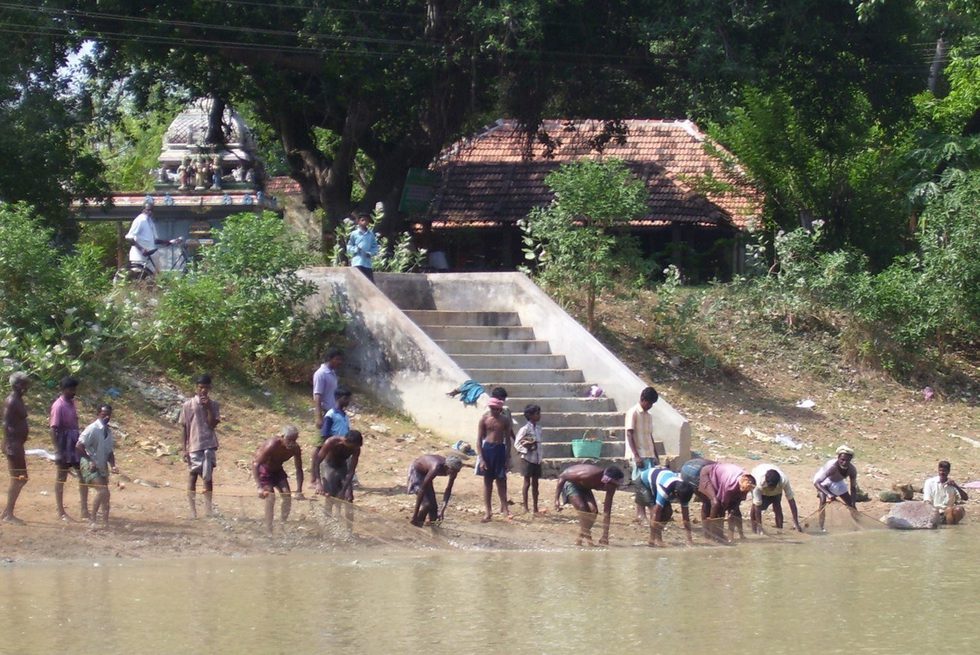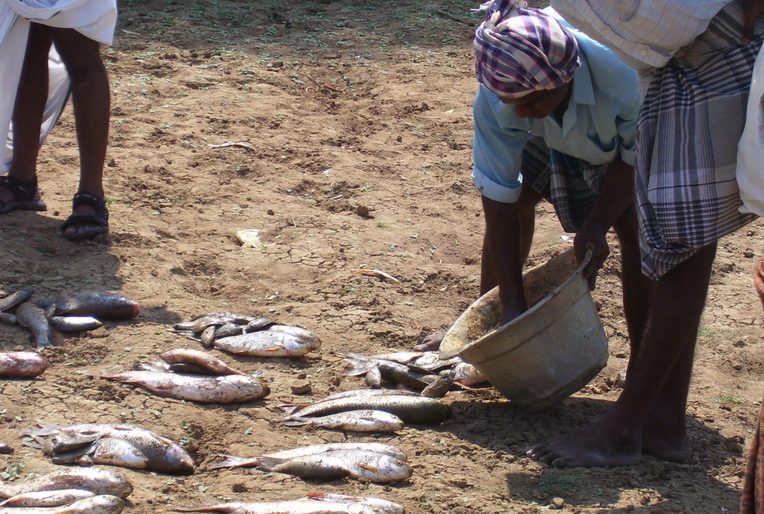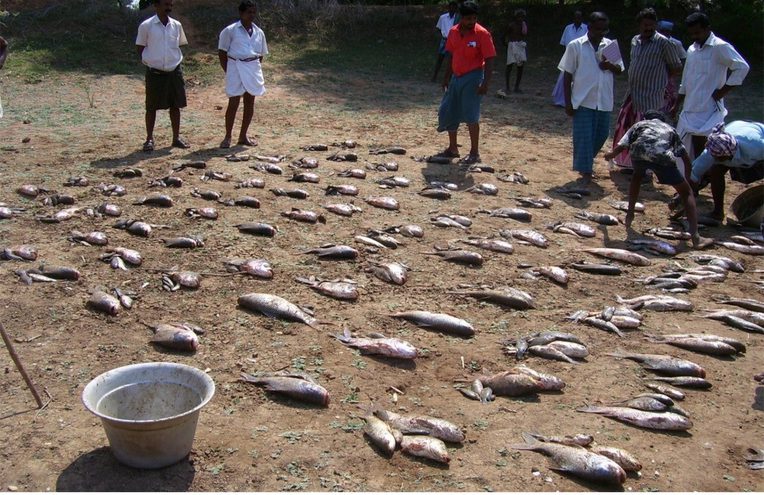Kin But Not Kind: An Anthropologist Among ‘Her People’
From the Series: Denaturalizing Ethnographic Epistemology
From the Series: Denaturalizing Ethnographic Epistemology

I was documenting a mass fishing ritual at the pond to which my father’s lineage group has rights in the village of Vaduvur, Tamil Nadu.
Upon finding out who I was, several of my father’s lineage-mates asked,
You are Arumugam’s daughter? Have you come to collect your father’s share?
To my surprise, the organizers then handed me a meticulously weighed share of fish.

Only members of my father’s kin group have claims on this commonwealth of fish and the constellation of political rights they embody.

Simply by virtue of my descent (as ‘a woman born into a lineage’ or poranta-ponnu in Tamil), I was thrust into the heart of this kinship polity from the very beginning, whether I knew it or not. I had a priori rights, albeit complicated by my gender, to a tutelary deity, a sacrificial cult and shares of sacred fish and meat. I had inherited claims upon and obligations to kinfolk as they did to me.
You are Mangai’s daughter? Your mother and I were classmates.
Your grandfather is from a headman family.
MG mentioned that his niece from Singapore was coming to do research.
I was seldom introduced or encountered as an anthropologist. Instead, I was often understood in relation to my position within historical and contemporary kin networks.
Yet, since the beginning of my anthropological career, the value of alterity—in producing empirical knowledge from an “objective” stance—was impressed upon me. Before I embarked on fieldwork, my graduate advisor cautioned,
Be careful. Your interlocutors will see you as a trophy—one of their own, returned from Singapore, studying for a PhD in London.
They will want to claim you. Always be skeptical about the information they provide.
These warnings were especially urgent given my positionality with respect to my doctoral research, which I conducted in the village where my family originates from, and where I was born. In Vaduvur, I worked with interlocutors who, even prior to my arrival in the field, were already kin. In the 1920s, my paternal grandfather migrated from Vaduvur to Singapore. He returned to his village, married my grandmother, and both settled in Singapore. Consequently, all my paternal kin are Singapore citizens. My father, the youngest son, traveled to Vaduvur and married my mother. So, my maternal kin reside in Vaduvur to this day. Although I was born in Vaduvur, I had never been there for any meaningful amount of time until my fieldwork.
Due to familial pressures, I stayed with my maternal uncle’s family throughout my fieldwork. During fieldwork, I was ensconced deeply within the nexus of my mother’s fellow villagers, street-mates, neighbors, friends, and close kin who were intimately familiar with my mother’s history and even my own childhood exploits. Yet, affinity was presented as inimical to ethnographic objectives and the objectivity expected of an anthropologist. Soon my own observations, rather than my interlocutors’ exegeses, dominated my fieldnotes. Not only could I not trust my interlocutors, but I did not trust myself to remain distanced from and disinterested in my kin. So, my initial fieldwork largely involved distancing myself from my relatives and subjecting their accounts to the corroborations and triangulations enjoined by my graduate training. Transforming discourse into viable data involved my denying the (a priori) mutuality of being between myself and my interlocutors that comprises kinship. To be an anthropologist, I needed to assert that I was not a native—but an unmarked bearer of “objective knowledge” capable of cleanly identifying a bounded object of study distinct from myself—even as I was insistently and repeatedly claimed and exclaimed over as a relative (albeit long-lost).
My own dilemmas played out amid ongoing debates about who is a native and who gets to decide. Even as Abu-Lughod (1991), Srinivas (1995), and Jacobs-Huey (2002) spoke of the credibility and representative legitimacy of “native” voices, Kirin Narayan’s (1993, 677) germinal essay problematized anthropologists being ascribed the status of or claiming to be “insiders regardless of their complex backgrounds.” I may be from the same village as my interlocutors, but I had never lived there. I may have looked like my interlocutors, but they knew I was not a local from the way I walked, talked, or carried myself. I may know Tamil but not the specific idioms that the villagers used. I may have been familiar with the contours of Vaduvur’s socio-cultural dynamics, but I knew them as abstract theories rather than through intimate lived experience. Migration away from Vaduvur, citizenship in Singapore, urban lifeways, differential class location and graduate education undermined any easy and essential claims to nativity.
Several villagers, including my relatives, found me similarly difficult to define. My cousin, kin, and neighbors critiqued my ‘unladylike’ ways and foreign upbringing.
You cannot leave the house without a shawl. Yes, your clothes fully cover you. But the shapes of your breasts are visible.
Tie up your hair. A woman leaving her hair loose is bad for the family. Yes, it’s still wet. But you are setting a bad example for the children.
At other times, they were relieved that despite my privileged Singaporean upbringing, I seemed just like a village girl. Their previous encounters had led them to expect Singaporeans to be arrogant and reticent. The cousin who hosted me feared that I would make demands impossible to fulfill in a village. She was relieved to find me so “un-Singaporean.”
You are just like a village girl. Simple. No ostentation. I almost forget you grew up in Singapore.
You talk like us. You talk to us… without any qualms. Easily…
Given my upbringing, I may not exactly have been their kind, but nevertheless I was their kin. Even before I arrived in Vaduvur, I was already enmeshed in webs of kinship that I had done little to spin. Like other anthropologists, I had to work to forge, sustain and enrich relations with many interlocutors. But with many others, I was embraced and enfolded into already existing kin relationships through no effort of my own.
Easing my entry into village networks, these pre-existing kinship claims proved critical to how I made sense of the intimate political imaginary of ordinary people (Arumugam forthcoming). In Vaduvur, traditional political configurations and even the electoral process to constitute local government remain critically premised on kinship. Understanding my own rights within the polity sensitized me to the political implications of kinship positionalities and their attendant rights and obligations. I made sense of this vernacular polity’s musculature in the usual anthropological way; through poking my nose into everything and pestering people with questions. But to get at the marrow of things, I drew on my interlocutors’ a priori presumptions of our prevailing mutual kinship relations. Personal resonances—the enfolding into as well as unfolding of my own genealogy and my family’s past as part of the history of Vaduvur—grounded this political imaginary in kinship relations and intimate exchanges. Unravelling my own rights within and claims to (and also marginalization and exclusion from) these kinship-polities made my interlocutors’ political imaginaries visceral for me.
My ethnographic project therefore involved judiciously claiming affinity while also asserting my alterity. Ethnography, Ortner (2006, 42) argues is the “attempt to understand another life world using the self—as much of it as possible—as the instrument of knowing.” My kin-entangled self became key to accessing and deciphering my interlocutors’ kin-suffused lifeworlds and political ways. In one instance, I found myself at a funeral where I performed the last rites a granddaughter owes to her classificatory grandfather—circumnavigating the coffin, strewing flowers, miming feeding the deceased a last mouthful of rice, and beating my breast according to the mourning norms. But even as people around me were weeping, lamenting, and vociferously expressing their grief, I was decentering myself and disavowing kinship to forestall critiques of lacking objectivity. I tried to hang back, blend into the crowd, stay still, and dispassionately observe so as to take notes to analyze later. These ambidextrous maneuvers speak to the ambivalent nature of my own identity and relations with my interlocutors. While I could assume kinship with my interlocutors, this still had to be made meaningful through careful attention and committed cultivation. Inherited relations and abstract rights and obligations had to be actualized through intimate experience.
And yet, try as I might to estrange myself from my kin—through recourse to anthropological theories, texts, and techniques—to turn them simply into interlocutors, they refused to let me do so. Disrupting any claims to exclusively anthropological authority were not just the meanings, emotions, and ambience generated through reflecting on ethnographic phenomena through my prior and personal connections. Every story, every memory my mother had shared about her village came alive. To finally experience for myself the places, peoples, and phenomena that she had told was thrilling. To ethnographically grapple with, if not settle, questions that had haunted me since childhood, was deeply satisfying (Arumugam forthcoming). In helping to braid together intimate insights into people’s lives, Tamil knowledge practices, and anthropological theorizing, this frisson of familiarity animated my project with wonderment and warmth. No matter how much I tried to abstract personal heritage into purely intellection concerns, vivifying this research is also the remembrance of my ancestors, the genesis of my family and myself, and the accommodative affinity readily offered by my contemporary kin. Even as it eschews any easy or essentialist claims of a native positionality, my anthropology remains moored to my biography and genealogy.
Indira Arumugam is an anthropologist who works in Tamil Nadu, South India, and among the Tamil Diaspora in Singapore and Southeast Asia. She is an Assistant Professor in the Department of Sociology and Anthropology at the National University of Singapore. Her research interests include vernacular political imaginaries, ritual theories and practices, intimate economics of (re)production, modalities of sacrality and monstrosity, play and pleasure, and popular Hinduism. Her writings on animal sacrifice, divine agency, rituals, the gift, kinship, and monsters have appeared in journals of anthropology, religion, and Asian Studies, such as Social Anthropology, Hau: Journal of Ethnographic Theory (forthcoming), American Behavioral Scientist, Material Religion, Modern Asian Studies, and Contributions to Indian Sociology. Her book Visceral Politics: Intimate Imaginaries of Power in South India is forthcoming.
Arumugam, Indira. Forthcoming. “Hunting for (Gods and) Monsters: The Making of an Anthropologist.” In Living with Monsters: Ethnographic Fiction about Real Monsters, edited by Yasmine Musharbash and Ilana Gershon. Goleta, C.A: Punctum Press.
———. Forthcoming. Visceral Politics: Intimate Imaginaries of Power in South India.
Abu-Lughod, Lila. 1991. “Writing Against Culture.” In Recapturing Anthropology: Working in the Present, edited by Richard G. Fox, 137–54. Santa Fe, N.Mex.: School for Advanced Research Press.
Jacobs-Huey, Lanita. 2002. “The Natives Are Gazing and Talking Back: Reviewing the Problematics of Positionality, Voice, and Accountability among ‘Native’ Anthropologists.” American Anthropologist 104, no. 3: 791–804.
Narayan, Kirin. 1993. “How Native Is a ‘Native’ Anthropologist?” American Anthropologist 95, no. 3: 671–86.
Ortner, Sherry B. 2006. Anthropology and Social Theory: Culture, Power, and the Acting Subject. Durham, N.C.: Duke University Press.
Srinivas, M. N. 1995. “Some Thoughts on the Study of One’s Own Society.” In Social Change in Modern India, 155–171. Hyderabad, India: Orient Blackswan.